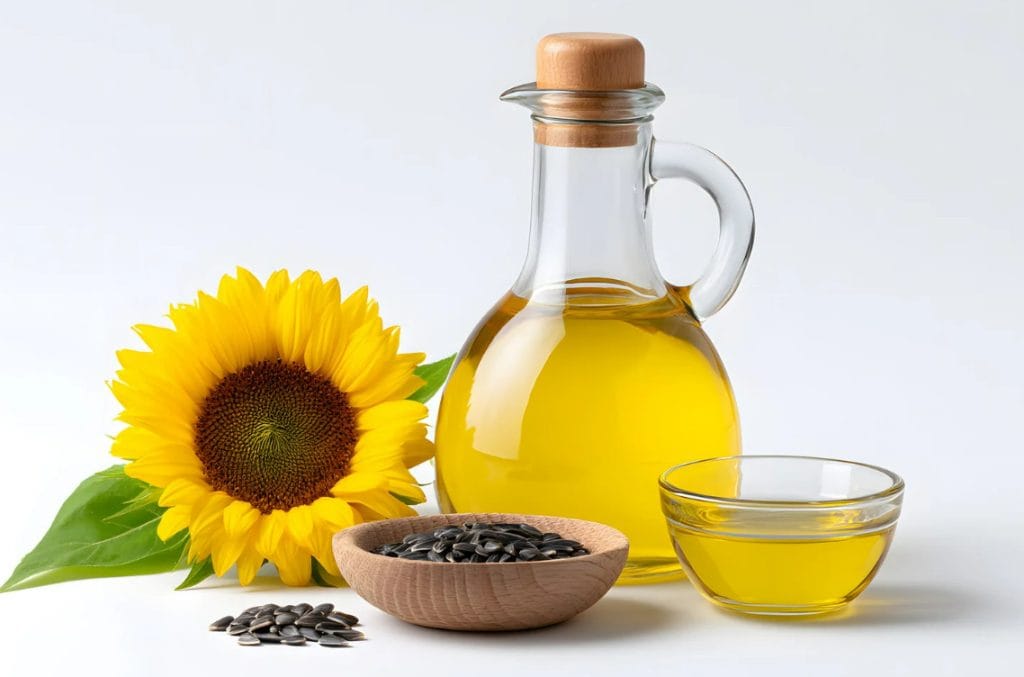When it comes to cooking oils, sunflower oil is a popular choice worldwide. However, there are different types of sunflower oils available, each with unique health benefits. The two most commonly used types are high oleic sunflower oil and regular sunflower oil.
Both are derived from sunflower seeds, but they differ significantly in their nutritional composition, health benefits, and applications in the kitchen. Understanding these differences is key to making the best choice for your health and cooking needs.
In this article, we will compare the health benefits of high oleic sunflower oil and regular sunflower oil. We’ll delve into their nutritional profiles, explore their effects on heart health, weight management, and inflammation, and provide insights into how each oil can benefit your diet.

What is High Oleic Sunflower Oil?
High oleic sunflower oil is made from sunflower seeds that are specially cultivated to have a higher concentration of oleic acid, a type of monounsaturated fat. Unlike regular sunflower oil, which contains a mixture of different types of fats, high oleic sunflower oil is predominantly composed of oleic acid, making it a heart-healthy oil.
The high oleic content not only provides stability to the oil but also enhances its shelf life. This type of sunflower oil is less prone to oxidation than oils high in polyunsaturated fats, which makes it a better choice for high-heat cooking. High oleic sunflower oil also retains more of its beneficial properties over time, which is one reason why it is often used in food production.
What is Regular Sunflower Oil?
Regular sunflower oil is derived from traditional sunflower seeds and contains a blend of polyunsaturated fats, particularly omega-6 fatty acids, along with monounsaturated and saturated fats. This oil has a mild flavor and is commonly used in frying, baking, and sautéing.
While regular sunflower oil is still a healthy choice for many, its higher content of omega-6 fatty acids means that it can contribute to an imbalance of omega-6 to omega-3 fatty acids in the diet. This imbalance has been associated with increased inflammation, which can be harmful to health when consumed in excess.
Nutritional Comparison: Fats and Vitamins
One of the main differences between high oleic sunflower oil and regular sunflower oil lies in their fat composition.
- High Oleic Sunflower Oil: High oleic sunflower oil is rich in monounsaturated fats, specifically oleic acid, which makes up about 80% of its fat content. Monounsaturated fats are known to be heart-healthy as they can help lower levels of LDL (bad) cholesterol and raise HDL (good) cholesterol. Additionally, this oil contains higher levels of antioxidants, such as vitamin E, which can help protect cells from oxidative damage.
- Regular Sunflower Oil: Regular sunflower oil, in contrast, is primarily composed of polyunsaturated fats, with omega-6 fatty acids making up the majority of its fat content. While omega-6 fats are essential for the body, excessive consumption, particularly without adequate omega-3 intake, can lead to inflammation. Regular sunflower oil also contains a smaller amount of vitamin E compared to high oleic sunflower oil.
Cardiovascular Benefits
Both high oleic sunflower oil and regular sunflower oil offer cardiovascular benefits, but in different ways.
- High Oleic Sunflower Oil: Thanks to its high content of monounsaturated fats, high oleic sunflower oil is beneficial for heart health. Studies have shown that monounsaturated fats can lower LDL cholesterol levels while raising HDL cholesterol levels. This makes high oleic sunflower oil a good choice for those looking to improve their heart health and reduce the risk of cardiovascular disease. Additionally, its antioxidant content helps protect the heart from oxidative stress.
- Regular Sunflower Oil: While regular sunflower oil does contain some monounsaturated fats, it is primarily made up of polyunsaturated fats, particularly omega-6 fatty acids. A balanced intake of omega-6 and omega-3 fatty acids is essential for reducing inflammation and promoting heart health. However, an excess of omega-6 fats, especially in the absence of omega-3 fats, can contribute to chronic inflammation and may increase the risk of heart disease.
Effects on Weight Management and Metabolism
The types of fats you consume play an important role in weight management and metabolism. Both high oleic and regular sunflower oils have an impact on how your body processes and stores fat.
- High Oleic Sunflower Oil: Monounsaturated fats, like those found in high oleic sunflower oil, are often associated with better weight management. Studies suggest that diets rich in monounsaturated fats can improve insulin sensitivity and help maintain healthy blood sugar levels. These oils also contribute to a sense of fullness, which may help control overeating and support healthy weight management.
- Regular Sunflower Oil: While regular sunflower oil can still be part of a healthy diet, its higher polyunsaturated fat content, especially omega-6 fatty acids, may not be as effective in supporting metabolism and weight management. Excessive consumption of omega-6 fats, particularly in high amounts, can contribute to an imbalance in the body’s fat stores and may lead to issues with weight control.
Antioxidant and Anti-Inflammatory Properties
Both types of sunflower oil contain antioxidants, but high oleic sunflower oil has a significant advantage in this area.
- High Oleic Sunflower Oil: High oleic sunflower oil is rich in vitamin E, a powerful antioxidant that helps protect the body’s cells from oxidative stress. Oxidative stress is a process that can damage cells and tissues, leading to chronic diseases like cancer and cardiovascular disease. The high level of monounsaturated fats in this oil also contributes to its anti-inflammatory properties, which can help reduce inflammation in the body and protect against conditions like arthritis and heart disease.
- Regular Sunflower Oil: Regular sunflower oil does contain some vitamin E, but in lower quantities compared to high oleic sunflower oil. It also has a higher concentration of omega-6 fatty acids, which, when consumed in excess, may promote inflammation rather than reduce it. Balancing omega-6 intake with omega-3s is important for maintaining healthy inflammation levels in the body.

Best Uses for Health Optimization
To maximize the health benefits of sunflower oil, it’s important to choose the right oil for the right purpose.
- High Oleic Sunflower Oil: Given its higher stability and health benefits, high oleic sunflower oil is the ideal choice for high-heat cooking methods such as frying, grilling, and sautéing. It is also an excellent option for making salad dressings and drizzling over cooked vegetables. The oil’s neutral flavor ensures that it won’t overpower the taste of your dishes while providing heart-healthy fats and antioxidants.
- Regular Sunflower Oil: Regular sunflower oil is a versatile cooking oil that works well for everyday uses such as baking, sautéing, and light frying. However, because of its higher polyunsaturated fat content and lower smoke point, it may not be the best option for high-heat cooking. It is still a good choice for recipes that do not involve frying at high temperatures.
Conclusion
Both high oleic sunflower oil and regular sunflower oil offer health benefits, but they differ significantly in terms of their nutritional composition and impact on health. High oleic sunflower oil is the clear winner when it comes to heart health, weight management, and reducing inflammation.
Its high content of monounsaturated fats and antioxidants makes it a better option for cooking at high temperatures, while also providing more long-term health benefits.
Regular sunflower oil, while still a healthy option, may not provide the same level of stability or antioxidant protection as high oleic sunflower oil. However, it remains a good choice for lighter cooking and can be included in a balanced diet when used in moderation.
Choosing the right sunflower oil depends on your specific health goals and cooking needs. For those prioritizing heart health, metabolism, and antioxidant intake, high oleic sunflower oil is the best choice. Regular sunflower oil, on the other hand, can still be part of a healthy diet when balanced with other healthy fats.
